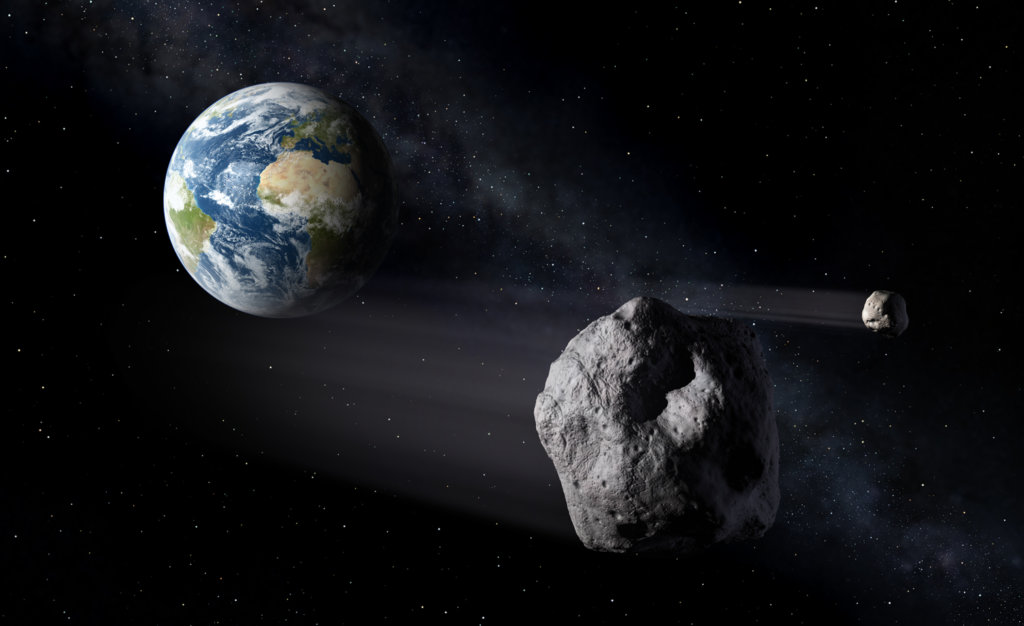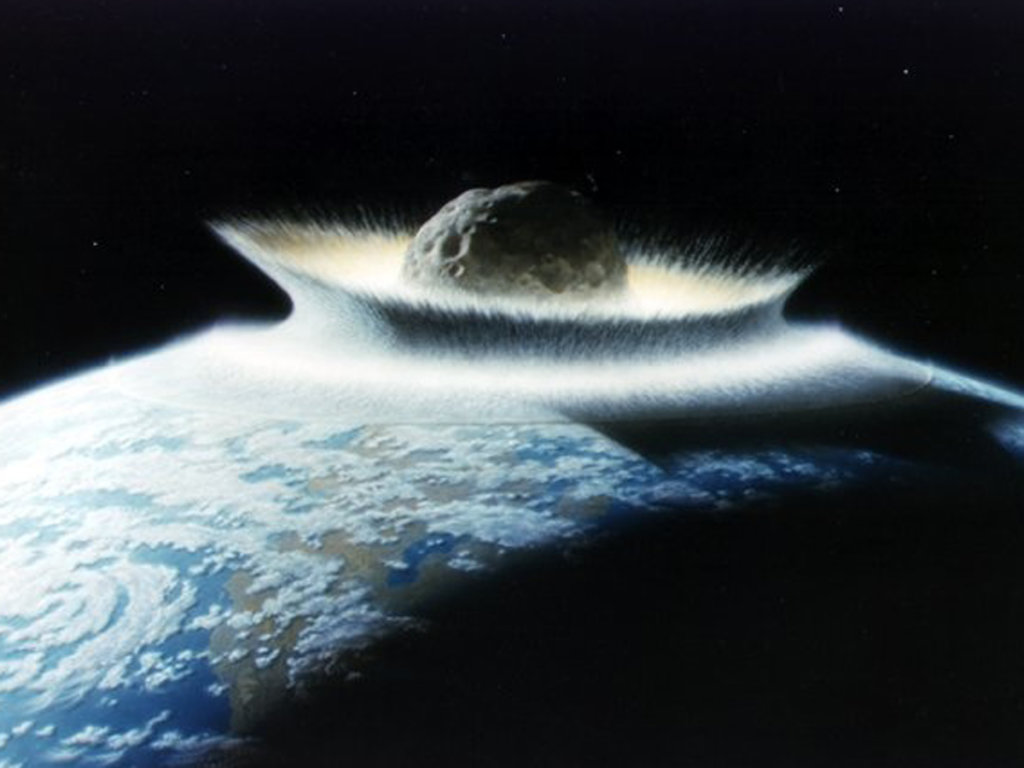Will An Asteroid Hit The Earth Again?
How to avoid a rocky end
Video of the day September 19th 2019
From the implications of it all, to what it might take to get rid of one on its way, join us as we explore the question of whether an asteroid will hit Earth.
7. Why Should We Fear An Impact With An Asteroid?
Anyone who knows how the Earth “works” knows that there is an inherit safety measure that protects us from most violent things in space, it’s called the atmosphere. You may not realize it, but only does the atmosphere allow us to breathe and stay warm via keeping the gasses and heat within reach of us, it also protects us from things like harmful radiation and falling rocks from space.
This is why things like meteorites exist. They come from larger entities, and yet by the time they reach the atmosphere, the intense heat caused by the object falling through the invisible layer of our planet ends up making the object really, really small. One that can harm people and singular objects, but rarely do. And when they do, it’s not on a planetary scale.
So should we not fear things like an asteroid coming to our planet? Just the opposite. Because typically, asteroids are so large and so dense that the atmosphere alone can’t stop it. Or in this case, shrink it down to non-planet ending levels. So should one come our way in the modern age that we live in, there’s no doubt in anyone’s mind that we would be in trouble. And if you don’t believe that, you need only look at our history, and the history of our solar system, for proof of that.

6. We’ve Been Hit By Asteroids Before
Pop quiz, what killed the dinosaurs? If you said an asteroid, you’d be correct. There is loads of evidence that states that the event that ended the lives of pretty much every dinosaur on the planet was caused by the impact of an asteroid hitting our planet. This in turn created the ice age, which drastically affected our planet and helped shape what it is now.
You wouldn’t be ignorant for thinking that this was the only time that the Earth has been hit by a major asteroid, but you would still be wrong. Believe it or not, over the course of its life the Earth has been hit by MANY asteroids. The proof of which is in the ground of certain areas. For when an asteroid, meteor or meteorite hits the ground, they leave a crater. And across the world, there are impact sites that are both visible and not. Many have eroded over the years, while others have adapted to the areas they’re in.
If you were to look at places like the moon, Mercury, and even Mars, you would see plenty of craters on the surface of those entities. In fact, many meteorites that have fallen to Earth from Mars have been because of asteroids hitting the planet.
What’s more, while they don’t cause planetary-wide destruction, about 15,000 tonnes of space rock hit the Earth every year. Some of which can be 3-feet in diameter, and others up to 23 feet in diameter. The later of which has the explosive yield of an atomic bomb. Though to be fair, those only show up every five years or so if that. And when they do “arrive”, they most times hit the water, or are honestly not viewed by anyone around. But don’t let this fool you, they are still very dangerous.
5. The Size Issue
The phrase, “the bigger they are the harder they fall” honestly does apply to asteroids, and the bigger they are when they enter the atmosphere, the more likely they are to cause a massive event. Now, on the good news side, many asteroids that are of truly “destructive” weight and mass don’t hit the Earth too often. But they do hit. Ones that are above 60 feet in diameter tend to hit the Earth about twice every one hundred years. Scarily enough, one such asteroid hit us in 2013 in Russia.
It was the town of Chelyabinsk where everything happened, and it was REALLY close to a worst case scenario because despite all of our technology and abilities, the asteroid went close to Earth, came into the atmosphere and wasn’t noticed by ANYONE until it was mere miles above the surface. Good news again, it didn’t impact the surface, it instead blew up in the air about 19 miles above the ground.
Bad news, the asteroid itself was 60 feet wide, weighed as much as the Eiffel Tower, and debris from that rock scattered all over the area. 7200 buildings were damaged costing over $30 million dollars in damage when adding in the other damaged items. Also, 1500 people were injured by this explosion of rock. So imagine if it had actually impacted the Earth. The devastation would’ve been felt all over Asia.
And that’s why this topic is called the “size issue”, because you see what happens when ONE decently size asteroid comes and does damage to Earth. So imagine now how a MAJOR asteroid would fair. You know, like the one that killed the dinosaurs?
Is that likely to happen though? Oh yeah, and it’s almost happened multiple times in recent history.
4. Near Misses
What’s scarier than having a dangerous event happen? How about having a MUCH more dangerous event nearly happen? That 2013 incident for example was bad, but a mere 16 hours AFTER that one occurred, another major asteroid came to Earth, but it missed it. What’s more, that asteroid was about 100 feet wide, so it would’ve caused much more damage if it had come even somewhat close to the Earth’s surface.
If you rewind back to March of 1989, an asteroid that was nearly 1000 feet in diameter barreled towards the Earth…and it missed us by six hours. No, really, if that asteroid was faster and had reached us six hours ahead of time, it would’ve hit us. In terms of miles, it was only a little over 400 miles away from us. That’s REALLY close. And its effects would’ve been felt even if that asteroid hit the water.
Ironically enough, an asteroid known as Tunguska hit the Earth in 1908. And it was anywhere from 200-600 feet in diameter. Why do you not know about this event then when it did hit the Earth? Simple, it hit in the remote land of Siberia. Where basically no one was, and though the damage was said to be the size of Rhode Island in the United States, there wasn’t anyone around (especially in 1908) to study it, and make notes on it. We don’t even know if anyone died from the impact, though it’s likely as there are often some people in even the most remote areas of the world.
So as you can see, the Earth has come dangerously close to some major impacts over the years. And that begs the question…
3. What Can We Do About Asteroids?
There’s a lot of understandable fear in regards to asteroids, and since we now have much better technology, it goes to reason that there are people preparing to fight them off should one ever come our way. So, with that being said, can we stop a major asteroid before it hits the Earth and wipes us all out?
Ironically enough, the answer is yes, no, and maybe. Teams at places like NASA are working hard to ensure that any and all comets, meteors, and asteroids within a certain range of Earth are known, identified, and then speculated about whether they’ll hit Earth of not. This is a key part of the process because the last thing we need is to be caught surprise by one that is just miles away.
And with the technology and satellite imagery that we have today, it’s honestly getting easier for them to do and predict. But, as we stated earlier, as recently as 2013 an asteroid “slipped” by their sensors, so clearly there is some advances that still need to be made. But even if the detection element is refined to a massive degree of efficiency, that won’t solve everything.
After all, if we assume one is found to be heading towards the Earth, does humanity have the ability to take it out? No is actually sure of that answer to any degree of certainty. We’ve made plans, numerous countries and institutions have done simulations about could be done should one get too close, but the simple fact is, there’s no guarantee that anything they try will work. If we have the chance or time to try and take one out at all!

Many people, and movies, have proposed nuclear options for getting rid of asteroids as they clearly have enough force to do serious damage. The problem is that the asteroid is in space before it hits the Earth, and nuclear warheads aren’t equipped to go into space and do damage out there. Should you try and explode it in the atmosphere, you risk destroying the planet you’re trying to save in a much different way. Because while the explosion may not be felt on the ground, the radiation outpour will literally rain down and hurt many people. There’s also the issue that even if you didn’t destroy the atmosphere, you could break up the asteroid into smaller yet just as deadly pieces. Pieces which could massively destroy most of the planet instead of just one section. Again, not unlike the 2013 event.
There’s also the issue that the asteroid may be so dense that even the most powerful of our nuclear devices can’t put a dent in it.
Another “classic” from sci-fi movies and TV shows is the “Send a crew of people to the asteroid and have them blow it up” option. While clever in some ways, it’s also not an option that we can consider. First off, landing on an asteroid that is moving potentially very fast isn’t easy. It’s not like landing on the moon (which as the astronauts who went there noted has its own set of problems). Second, just like the nuclear option, if you don’t blow it up the right way, you’re sending massive chunks at the Earth rather than just one chunk. Which will cause lots of damage instead of helping us out in the long run.
So then, what are we doing to try and stop this from happening? Simple, we’re preparing. It’s impossible to know when the asteroid will hit, or even if it will hit. Because of that, people from all over are researching any and all options that are viable to try and get us as prepared as we can be.
The options that are being put forth by scientists range from “moving” the asteroids just enough so that they can get deflected away by our atmosphere, melting them with lasers so that they lose mass and thus impact when/if they land. And more.
Which brings us to the final problem, it’s REALLY hard to try and test these methods because we don’t have meteors we can openly test on in large quantities here on Earth. Even if we did, since meteors, asteroids, and more often have varying compositions depending on where they come from, just because one device works for one rock doesn’t mean it will work for another.
It’s very imprecise, but that hasn’t stopped people from trying to fix the problem, because it is a very big problem.
2. What Would It Do?
So if the worst should come to pass, what would it mean for the Earth as a whole? Well, as noted earlier, the location of where the asteroid would hit would be a big factor. If even a massive asteroid were to land in the middle of the Pacific Ocean, Atlantic Ocean, or somewhere near Antarctica, the effects would be felt on land, but maybe not as big as you might think. Then again, if it’s big enough, it could cause a tidal wave to be formed and wipe out a lot of areas near the coastline.
IF it were to strike land however, it would truly depend on where on the continent it landed. Like the Siberia asteroid in 1908, that one caused damage, and possible hurt cities via the shockwave, but it didn’t affect the world overall. So if the asteroid were to land say in a desert like the Sahara, or unpopulated states like Nevada, Wyoming, or something like that, the damage would be felt, but maybe not overwhelmingly impacted.
However, if it were to land in a major populated area…that area would be gone in a matter of seconds. Or at the very best, the shockwave would kill just about everyone in the area while the explosion would burn everything around it in a major radius to ash.
And of course, should the asteroid be big enough, and have enough mass, it could cause a shockwave that would wipe out all life. Or, cause an upheaval in nature that would cause storms of all kinds to rain havoc down.
It’s not a pretty though, but that is the danger that we are honestly facing.
1. But How Likely Is It To Happen?
To end this, let’s talk about the question of how likely it is that an extinction-level asteroid hits the Earth. In terms of round numbers, there are AT LEAST 14,000 asteroids in our area that have the potential to hit Earth. Thanks to our technology, we feel we know about 93% of them in regards to where they are, their sizes, and more. Over 1600 of them have been deemed by NASA to be “potentially dangerous”, which would be very bad for the Earth.
However, based on projections made by NASA and other space agencies, the only asteroid likely to collide with us wouldn’t be for another 150 years plus. And even then, that one is only twice the size of Tunguska, and doesn’t have the highest of chances to hit us.
Which is something important to note. It’s not just about having a rock be big enough to do damage, there has to be a LOT of factors that line up in order for it to hit the Earth. Such as when the 1989 asteroid missed us by 6 hours. Asteroids have been on their path for long periods of times, sometimes even millions of years. the Earth is also constantly moving, so this is a case where “two ships” passing in the night have to literally line up in order for a collision to happen.
So in the end, there is a heavy chance that Earth could be hit by another asteroid. But, by that token, there also is a heavy chance that we won’t.
subscribe to the insane curiosity channel
Insane Curiosity is a channel of astronomy, physics and future technology, which teach mostly about Space, Recent Space Discoveries/News, Future Events, The Solar System, Exoplanets, Mars, Colonization Plans, etc.). We prepare New videos almost every day. Learn With us and Stay Insanely Curious!

Subscribe For the Latest news & Updates
Subscribe For the Latest news & Updates
Get in touch with the Insane Curiosity Channel. Once in while you will receive emails about news, promos, and much more. Stay Tuned!
Insane Curiosity
Science made easy
All rights reserved
Who we are
Insane Curiosity is a channel of astronomy, physics and future technology, which easily explain science. We need science and science need us!
